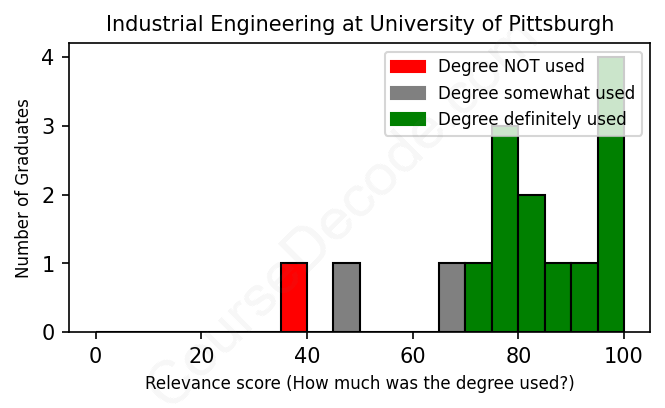
First, some facts. Of the Industrial Engineering graduates from University of Pittsburgh we've analyzed , here's how many have used (or NOT used) their degree in their career:

These are estimates based on AI analysis of 15 LinkedIn profiles (see below).
The verdict? Significantly above average. Overall, with an average relevance score of 79%, Industrial Engineering graduates from University of Pittsburgh have a much higher likelihood (+12%) of finding work in this field compared to the average graduate across all fields:
And for comparison, here's the chart for all profiles we've looked at across all degrees.
Also, after graduating, only 26% of these graduates have pursued further education other than another Bachelor's degree (such as a Masters degree or other), compared to the average across all profiles of 35%. This suggests a Bachelors degree is enough for most Industrial Engineering graduates, and it's normal to look for work straight after graduation.
See the details:
|
Relevance score: 39% We think this person has NOT gone into a career related to their degree. We think this person has NOT gone into a career related to their degree.
DEGREE INFOGraduated in 2012 from University of Pittsburgh with a Bachelor's degree in Industrial Engineering. Also pursued further education since (see below). JOB HISTORY SINCE GRADUATIONManufacturing Engineer Eaton Corporation Jul 2012 - Jan 2014 Industrial Engineer, Ahold USA  Ahold Delhaize Jan 2014 - Jun 2015 Program Manager, Optimization, Ahold USA  Ahold Delhaize Jun 2015 - Dec 2017 Program Manager, Innovation & Strategic Initiatives  The GIANT Company Jan 2018 - Apr 2019 IT Product Manager & Business Consultant  Ahold Delhaize USA Apr 2019 - Present FURTHER DEGREES DONE SINCE GRADUATINGMaster of Business Administration - MBASaint Joseph's University - Erivan K. Haub School of Business 2015 - 2018 ABOUTExperienced Project, Portfolio & Program Manager with a demonstrated history of innovation and industry leading projects in retail including large scale technology rollouts and engineering capital projects. Currently leading our Omni-Channel Customer Service program in the IT portfolio for implementing Salesforce and conversational AI. Also led one of the largest implementations in the world of autonomous Robots in retail for Giant Company several years back with Marty the robot (was the program lead and helped contribute to design, implementation and strategic planning). Strong business development professional with an MBA focused in Marketing from Saint Joseph's University as well as a Bachelor's in Industrial Engineering from the University of Pittsburgh. Expertise in project and program management end to end, portfolio budgeting, engineering initiatives (mechanical and software) and business case narratives. |
The top 10 most common jobs done by the graduates we've analyzed (ranked most common to least) are:
From analyzing the LinkedIn profiles of graduates from the University of Pittsburgh with degrees in Industrial Engineering, it seems like a lot of them have landed roles that are pretty relevant to their field. Many have taken up positions in companies where they apply industrial engineering principles, like optimization, supply chain management, and process improvement. For example, numerous graduates have worked at FedEx Ground or Estee Lauder, where their jobs as Industrial Engineers or within supply chain roles really align with the skills acquired during their studies. It’s clear that positions involving operations engineering, supply chain management, and industrial engineering consulting are popular pathways for these grads.
However, it's interesting to note that not every job closely connects to industrial engineering. Some have ventured into roles like teaching or project management that don't heavily rely on their engineering expertise. For instance, those who became science teachers or business owners aren't putting their specialized skills to full use day-to-day. Overall, while many industrial engineering graduates have taken up roles that are highly relevant to their degree, there's also a noticeable mix of career paths where the connection to industrial engineering isn't as strong. So, it’s definitely a mix of staying in the engineering realm and exploring other interests!
Here is a visual representation of the most common words in job titles for Industrial Engineering graduates (this is across all Industrial Engineering graduates we've analyzed, not just those who went to University of Pittsburgh):

Graduates with a degree in Industrial Engineering from the University of Pittsburgh generally find themselves on quite promising career paths. Most of them start off with solid roles related to industrial engineering shortly after graduation, like working as industrial engineers, operations engineers, or consultants in major companies such as FedEx Ground, Estee Lauder, and Nike. It’s not uncommon for them to transition into management or specialized roles within a few years, indicating that they are moving up the ladder in their respective fields. For example, one graduate went from being an Industrial Engineer at FedEx Ground to a Special Projects Manager; others have climbed to director-level positions quite rapidly.
As they progress five to ten years out, many of these individuals seem to stay relevant in sectors associated with industrial engineering and supply chain management. This is evidenced by their various titles evolving from engineering roles to management positions, which highlights a natural growth into leadership and strategic roles within companies. Some have even transitioned into different areas like project management, indicating versatility in their skills. While there are a few outliers who have taken paths less directly related to industrial engineering, such as moving into teaching or starting their own businesses, the majority appear to be doing well within their field, suggesting that a degree in Industrial Engineering from the University of Pittsburgh is generally a strong foundation for a successful career. Overall, it paints a picture of graduates who are not just employed, but thriving in roles that utilize their education effectively.
Honestly, a Bachelor’s degree in Industrial Engineering can be pretty challenging, but it’s not impossibly hard. At the University of Pittsburgh, you’re looking at a mix of math, engineering concepts, and some business classes, which means you’ll need to be comfortable with numbers and problem-solving. Some students might find the workload manageable, especially if they like the subjects, while others might struggle a bit more, especially with things like statistics and optimization. It's definitely more rigorous than some majors, but it’s also not the most hardcore engineering path out there. If you're committed and willing to put in the work, you can totally handle it!
Most commonly, in the LinkedIn profiles we've looked at, it takes people 4 years to finish a Bachelor degree in Industrial Engineering.
Looking at the job paths of these Industrial Engineering graduates from the University of Pittsburgh, it seems like there’s a pretty wide range in how much they’re making. The ones who landed in management positions at big companies like Estee Lauder and Nike definitely seem to be raking in some decent salaries, probably well over six figures, especially considering their career progression to director and senior manager roles. On the other hand, some graduates who switched fields, like the ones teaching middle school or starting small businesses, likely aren’t making quite as much, especially in the early stages of their careers. Overall, if you're aiming for the higher end of the pay scale, sticking with engineering roles in big companies looks like a solid plan!
Here is a visual representation of the most common words seen in the "about" section of LinkedIn profiles who have a Bachelor degree in Industrial Engineering (this is across all Industrial Engineering graduates we've analyzed, not just those who went to University of Pittsburgh). This may or may not be useful:

Here are all colleges offering a Bachelor degree in Industrial Engineering (ordered by the average relevance score of their Industrial Engineering graduates, best to worst) where we have analyzed at least 10 of their graduates:
| College | Score | Count |
|---|---|---|
 Iowa State University Iowa State University
|
88 | 11 |
 North Carolina State University North Carolina State University
|
87 | 12 |
 California Polytechnic State University-San Luis Obispo California Polytechnic State University-San Luis Obispo
|
87 | 15 |
 Texas A&M University Texas A&M University
|
83 | 39 |
 Purdue University Purdue University
|
81 | 36 |
 University of Central Florida University of Central Florida
|
80 | 23 |
 Georgia Institute of Technology Georgia Institute of Technology
|
80 | 59 |
 Penn State University Penn State University
|
79 | 16 |
 Texas Tech University Texas Tech University
|
79 | 10 |
 University of Pittsburgh University of Pittsburgh
|
79 | 15 |
 University of Washington University of Washington
|
78 | 12 |
 University of Arkansas University of Arkansas
|
78 | 11 |
 University of Wisconsin-Madison University of Wisconsin-Madison
|
76 | 13 |
 University of Illinois at Urbana-Champaign University of Illinois at Urbana-Champaign
|
73 | 15 |
 West Virginia University West Virginia University
|
71 | 19 |
 Clemson University Clemson University
|
69 | 23 |
 University of Florida University of Florida
|
64 | 11 |